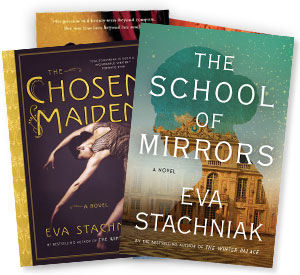I am often asked about the inspiration for “The Winter Palace.”
I am Canadian, but I am also Polish and in the Polish consciousness, Catherine the Great has always held a prominent place. This powerful and enigmatic woman whose love life intrigues and shocks generation after generation has crushed Poland and changed the course of her history.
I was drawn to Catherine for some time. Like me, she is an immigrant who had to re-invent herself, a German princess who came to Russia when she was fourteen. She is a powerful woman who survived and triumphed in a misogynous world and her presence towered over the eighteenth century Europe, the time I find irresistible.
Catherine the Great makes her fictional debut in my second novel Dancing With Kings (a.k.a. Garden of Venus), where she is one of the architects of the partitions of Poland and where she is remembered by her former lover, Stanislaw August Poniatowski, the last King of Poland. This is when I began thinking of writing about her, but The Winter Palace, truly began when—watching one of the few films about Catherine the Great The Young Catherine, starring Zeta-Jones—I noted that her Polish lover and the father of her second child does not merit a single scene.
Soon I was reading Catherine’s biographies, travelling to Warsaw and St. Petersburg, and searching for all mentions of Catherine in 18th century diaries. One of the sources I came across was the correspondence between the British ambassador to Russia at the time, Sir Charles Hanbury-Williams and Catherine, then the Grand Duchess at the court of Empress Elizabeth Petrovna. Sir Charles, Count Poniatowski’s friend and mentor, thought very highly of Catherine and was instrumental in bringing the two lovers together. It was in one of the letters that the young Grand Duchess wrote to him in 1756 that I found the intriguing sentence which became the motto of the novel: Three people who never leave her room, and who do not know about one another, inform me of what is going on, and will not fail to acquaint me when the crucial moment arrives.
The “crucial moment” is the death of the empress, and the more I thought about it all, Catherine’s spies in the imperial bedroom became more and more intriguing. And then I heard the voice of one of them. She was Polish. Her name was Barbara, Varvara in Russian, and her story and her re-telling of Catherine’s rise to power became The Winter Palace.
The friendship between Varvara and Catherine is the novel’s backbone. Both women are immigrants to Russia, both have to define themselves in the world of political maneuvering and shifting loyalties, both have to weight the price such transformations extort. And all along The Winter Palace draws on the history of the lands I come from, in hope that, to its readers, the novel will bring shades and hues where simple colours ruled so far.


Polish Language Site